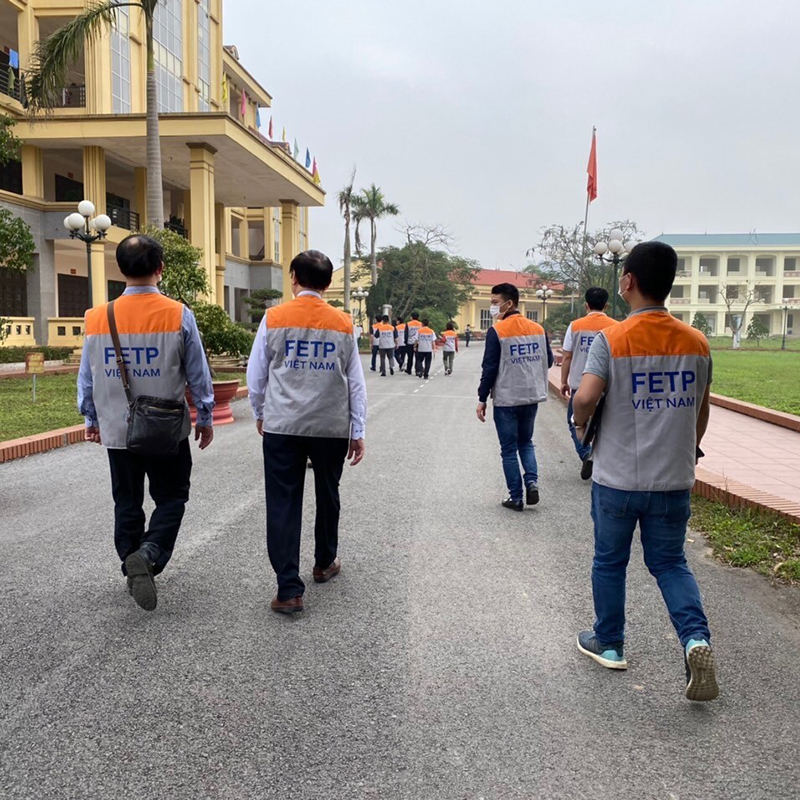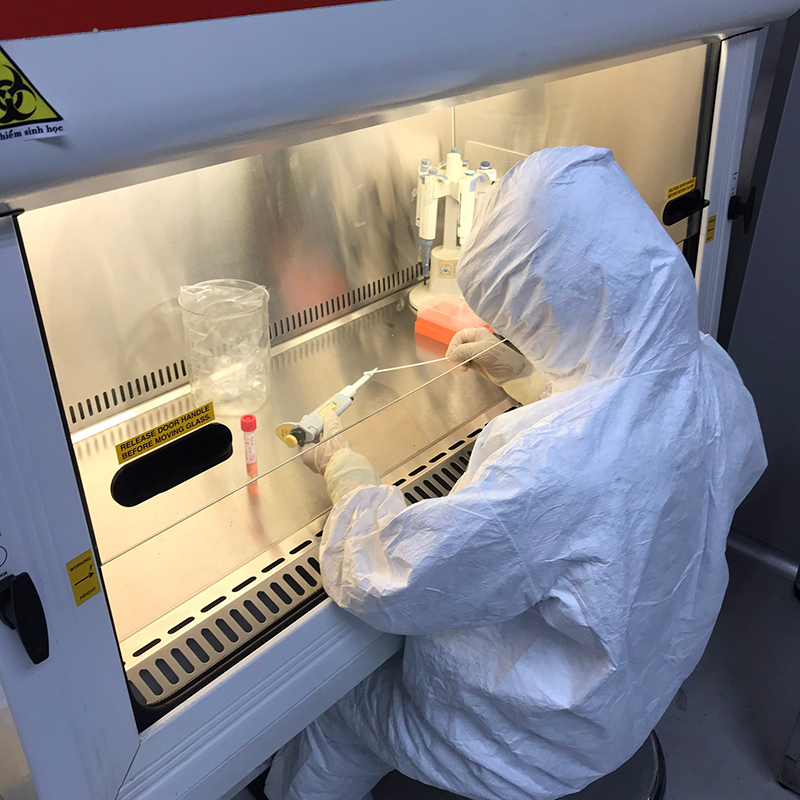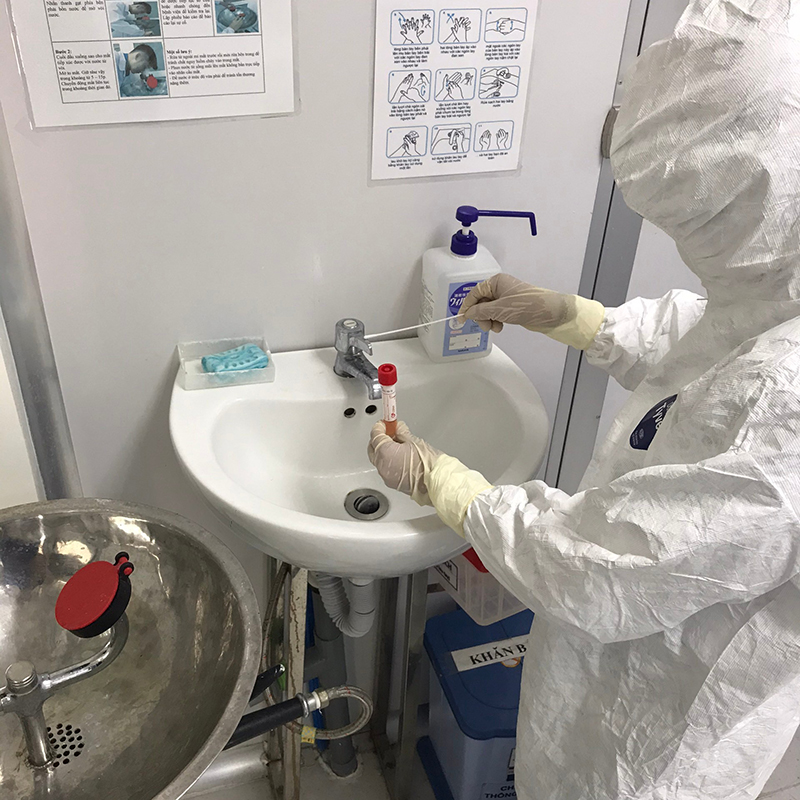Vietnam Responds to COVID-19 with Technical Support from CDC
The U.S. Centers for Disease Control and Prevention (CDC) has partnered with Vietnam since 1998 to address HIV, tuberculosis, and influenza, as well as to strengthen laboratory networks, surveillance systems, and workforce development. CDC has also collaborated with the government of Vietnam since 2014 to build public health capacity to prevent, detect, and respond to infectious disease threats through the U.S. government’s commitment to the Global Health Security Agenda.
Today, through trusted, high-level relationships with the Ministry of Health, CDC Vietnam is supporting the country’s response to the COVID-19 pandemic. Specifically, CDC Vietnam supports the Ministry of Health to develop guidelines for COVID-19 surveillance, laboratory testing, and infection prevention and control (IPC). CDC also provides direct technical assistance for IPC, laboratory testing, field investigations, surveillance, and data analysis.
Since its first case was identified on January 23, 2020, Vietnam has excelled in controlling the spread of infections through strong leadership and coordination, rapid case detection and isolation, rigorous contact tracing, and strict quarantine measures. The government of Vietnam’s rapid and strong response to COVID-19 demonstrates the impact of CDC’s capacity-building efforts and close collaborations with Vietnam government partners, both before and during the pandemic. As of June 9, 2020, only 332 cases of COVID-19 had been confirmed in Vietnam, and 316 of the individuals had recovered and been discharged from the hospital. This is a vital achievement.

The U.S. government and CDC support Vietnam’s Field Epidemiology Training Program (FETP), which trains field epidemiologists, or “disease detectives,” who assist in the COVID-19 response.
Below are two examples of how CDC’s support to Vietnam has helped to control COVID-19:
- Hanoi’s largest public hospital, Bach Mai Hospital, closed temporarily in March after COVID-19 was found to be spreading there. Testing and contact tracing began, and patients were transferred to further mitigate risks. Before the hospital reopened, CDC worked closely with the hospital and the National Institute of Hygiene and Epidemiology to investigate cases and contacts to determine epidemiologic links and possible modes of transmission, and to evaluate the hospital’s infection prevention and control practices.
- Key action steps and recommendations were jointly identified, discussed, and prioritized. This work was possible, in part, because of CDC’s longstanding partnership with the Vietnam Ministry of Health to build capacity through the national Field Epidemiology Training Program (FETP) and to strengthen infection prevention and control at hospitals in Vietnam
- CDC also helped investigate the presence of SARS-CoV-2 (the virus that causes COVID-19) on hospital and laboratory surfaces at Binh Thuan General Hospital, which treated most of the COVID-19 patients in Vietnam’s Central region, and at the Pasteur Institute of Nha Trang (PINT) Department of Immunology and Microbiology, which handles testing for the Central region. The hospital collected 450 samples, before and after cleaning and disinfection, from locations with frequent contact from patients and healthcare staff working with infected patients.
- Swabs were taken in patient rooms and staff areas from doorknobs, bed rails, faucet handles, file covers, tabletops, telephones, keyboards, and light switches. Similar samples were taken at the laboratory.
- No SARS-CoV-2 virus was found on any samples from the hospital or the lab, indicating that the current cleaning, disinfection, and biosafety practices at the facilities is working. It is also possible that the cases isolated were not shedding viable virus at the time and that viral remnants were degraded more quickly in the environment.
Vietnam’s rapid and effective COVID-19 public health response and health system preparedness have resulted to date in low case numbers, reducing the risk of transmission even in higher risk settings.

Taking a sample from a pipette surface used in a Class II biosafety cabinet at the Pasteur Institute of Nha Trang (PINT) laboratory. Photo Credit: Mr. Truong Tien Dat.
Taking a whole-of-government approach was key to success. Officials developed evidenced-based guidelines and trained healthcare and laboratory professionals to implement the guidelines down to the local level. Solid public health investigation techniques, such as proactively identifying cases and their contacts, and providing information transparently through a public website and SMS messages also made a difference.
CDC also supports training on sample collection, biosafety, and testing for laboratory and hospital staff at national hospitals and the provincial CDCs and hospitals of 11 central coast provinces, three highland region provinces, and 20 southern provinces.

Taking a sample from a faucet handle at the Pasteur Institute of Nha Trang (PINT) laboratory. Photo Credit: Mr. Truong Tien Dat.
Dr. Matthew Moore, Director of CDC Vietnam’s Global Health Security Program, highlighted the importance of the country office’s public health diplomacy efforts: “If you want to move fast, financial resources and technical assistance are essential. But if you want to go fast and far, it is the relationships—nurtured over a period of years with patience and respect—that will really get you there.”
CDC Vietnam’s senior leaders are the primary contacts for the U.S. Mission in Vietnam on the COVID-19 response, and the Embassy’s response team draws expertise from multiple programs, including CDC staff who serve on the epidemiology, laboratory, infection prevention and control, clinical, and communication task forces. Through the U.S. President’s Emergency Plan for AIDS Relief (PEPFAR), CDC is at the forefront in ensuring all HIV patients have unbroken access to essential treatment services during the pandemic.
CDC has contributed nearly $4 million of direct financial assistance to the government of Vietnam to support these activities and has dedicated 30 percent of its in-country staff to the Mission’s COVID-19 response.